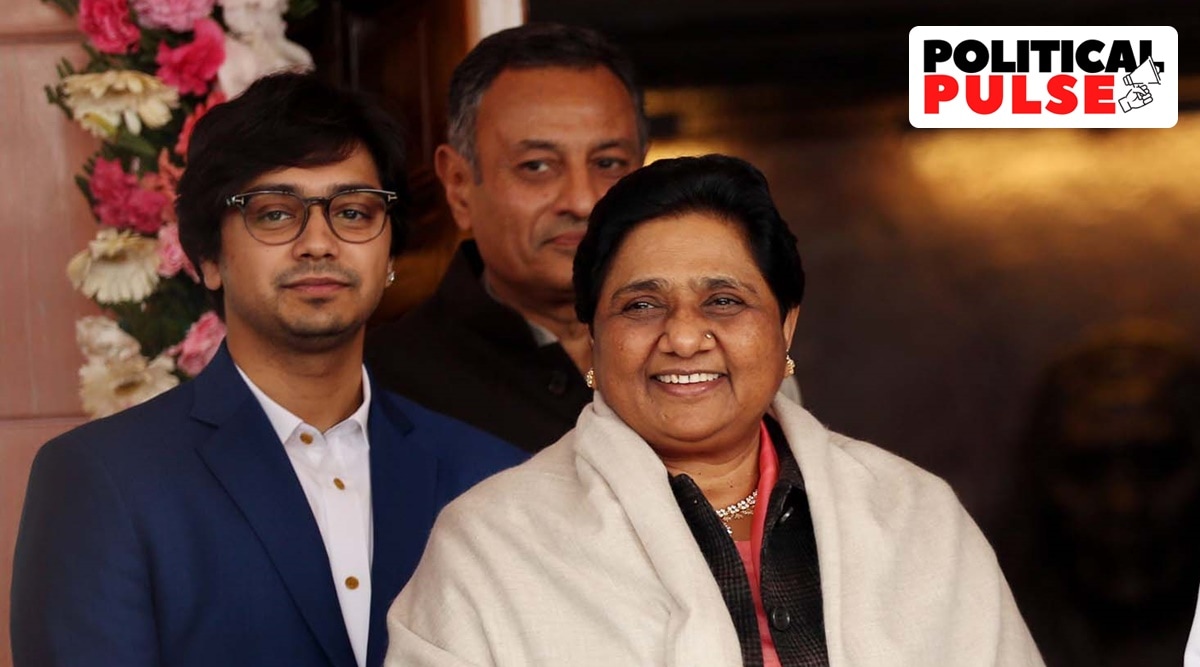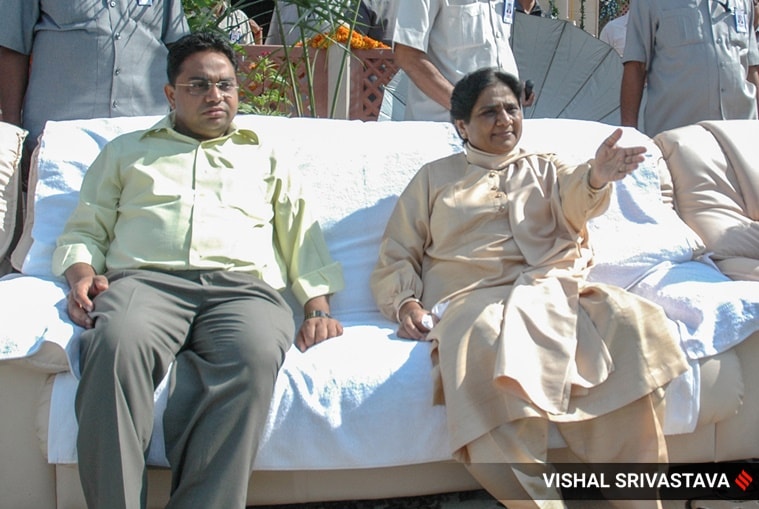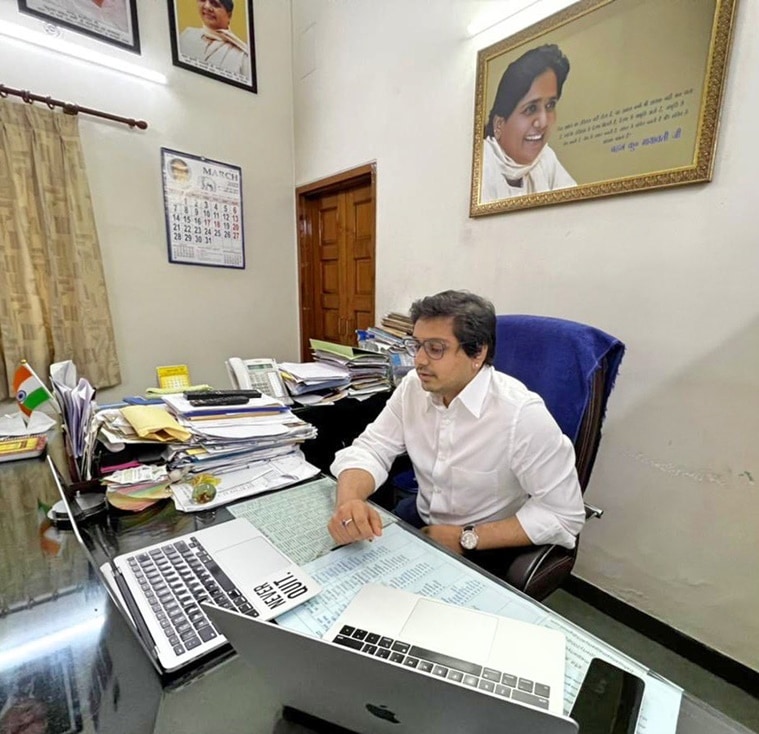 BSP supremo Mayawati with nephew Akash Anand (Express File Photo by Vishal Srivastav)
BSP supremo Mayawati with nephew Akash Anand (Express File Photo by Vishal Srivastav) Since it was reduced to one seat in the Uttar Pradesh Assembly, in its worst-ever performance, the BSP has made a series of organisational changes, moving away from the strategy to broadbase its appeal to upper castes, and sending a clear message that Mayawati’s brother and nephew are set to play a bigger role in the party.
Though one of the main reasons attributed for the BSP’s poor performance was its strikingly low-key and listless campaign in the Assembly polls that just ended, party leaders insist the BSP is already preparing for state elections five years from now and the 2024 Lok Sabha polls – and that the changes have been brought in with this in view.
One of these changes, amidst exit polls predicting a wipeout of the BSP, was the nomination of Mayawati’s nephew Akash Anand as the sole national coordinator of the party, moving the other national coordinator, Rajya Sabha member Ramji Gautam, as in-charge of eight other states. Mayawati’s brother Anand Kumar remains the No. 2 as national vice-president of the BSP.
 BSP supremo Mayawati with her brother Anand Kumar. (Express file photo)
BSP supremo Mayawati with her brother Anand Kumar. (Express file photo) Kumar, 55, Maya’s younger brother, was first appointed vice-president after the 2017 Assembly polls, when the BSP lost the second successive election in UP. In May 2019, Mayawati announced his resignation to counter allegations of nepotism, only to reappoint him within a month, along with his son Akash, then 28, as national coordinator.
A senior party leader said Akash had been handed the responsibility of bringing youths, especially from the Dalit community, to the party fold.
It marks another rise in the stature of Akash, the eldest of Kumar’s three children, who first burst onto the political scene in 2017, when the London-returned MBA degree holder was introduced by Mayawati as someone who would look after the party.
Around the same time, Mayawati also brought in Kumar, 55, who worked as a clerk in Noida before starting a real estate business. The BSP chief has continued to stick by him despite Kumar coming under the scanner of the Income Tax Department and other agencies in 2017 over allegations of “abnormal profits” made by his companies when Mayawati was Chief Minister between 2007 and 2012.
 Akash Anand, Mayawati’s nephew, at the BSP office in Lucknow (Photo: Twitter)
Akash Anand, Mayawati’s nephew, at the BSP office in Lucknow (Photo: Twitter) In July 2019, the Income Tax Department attached a seven-acre commercial plot in Noida, provisionally valued at Rs 400 crore, saying it was “beneficially owned” by Kumar and his wife Vichitra Lata.
Kumar now coordinates with the party’s zonal units and manages BSP finances.
A senior BSP leader said: “Akash leads a team of around 150 young workers based in Delhi, and his primary role is to connect youths with the BSP. He also looks at the party’s digital footprint and social media outreach.”
While the BSP has lost several senior leaders to other parties, including founder members, in its years out of power, a senior leader said Akash and his father Kumar have grown in proximity to Mayawati.
The other changes in the party appear to be prompted by the realisation that the aggressive outreach to Brahmins had not earned any dividends in the elections, and may have even cost it some Dalit votes. While the Dalit population in the state is estimated at around 21%, the BSP vote share was down to just 12.9% in the recent polls.
That number is closer to the proportion of the Dalit sub-caste of Jatavs, with the BSP worried that other groups like Chamars and Pasis might be moving to the BJP.
Ahead of the elections, BSP general secretary, the party’s Brahmin face and Mayawati confidant Satish Chandra Mishra had held a series of “sammelans” to reach out to the upper castes.
Since the poll results, the BSP has replaced its Brahmin leader and MP from Ambedkarnagar Ritesh Pandey as Leader in the Lok Sabha, bringing in his place Girish Chandra Jatav, a Dalit MP from Nagina. Pandey’s father incidentally won as an SP candidate from Jalalpur, which could be another reason for his removal.
In place of Girish Chandra Jatav, Sangeeta Azad, an MP from a reserved seat in Azamgarh district, has been brought in as the new BSP Chief Whip in the Lok Sabha. The two important posts in the party are now held by Dalits.
A BSP leader said the changes made sense: “Why will the Brahmin and Kshatriya communities vote for us? They will stick to the BJP.”
The leader said the strategy towards Muslims will also see a change. “Despite tickets to Muslims, the BSP could not attract the Muslim vote. Even Akhilesh kept quiet on Muslims to avoid polarisation, but Muslims still voted for him. We needed to be more active to reach out to the community.”
In Punjab and Uttarakhand where it fought elections, the BSP saw improvement in terms of seat tally in both, but the vote share didn’t move much. In Punjab, out of the 20 seats it contested an an ally of the Akali Dal, it won one, with a vote share of 1.77%. In 2017, when it had put up candidates in all 117 seats, it had not won a single and got 1.5% of the votes.
In Uttarakhand, the BSP won two seats out of the 54 it contested, getting 4.82% votes. Five years ago, the party had failed to open its account but got around 7% of the votes.
- The Indian Express website has been rated GREEN for its credibility and trustworthiness by Newsguard, a global service that rates news sources for their journalistic standards.

